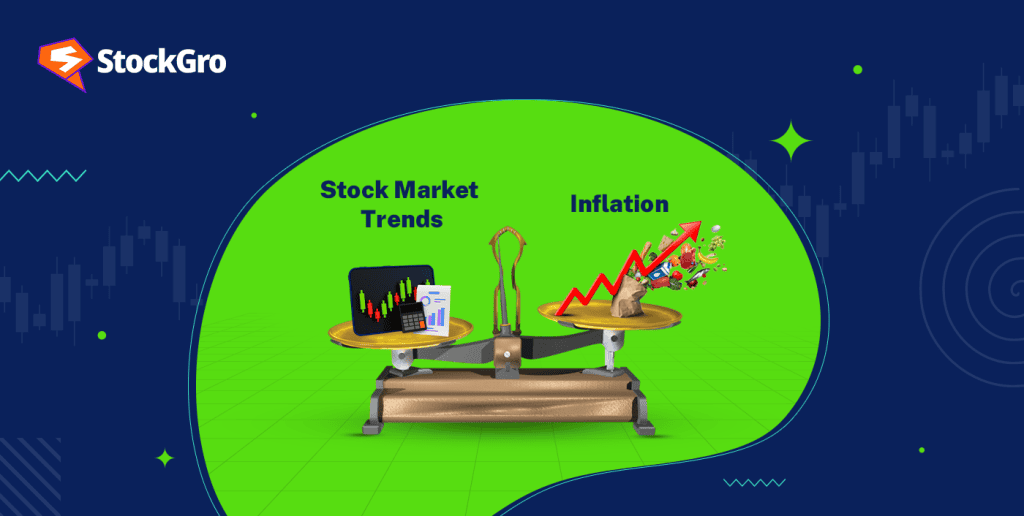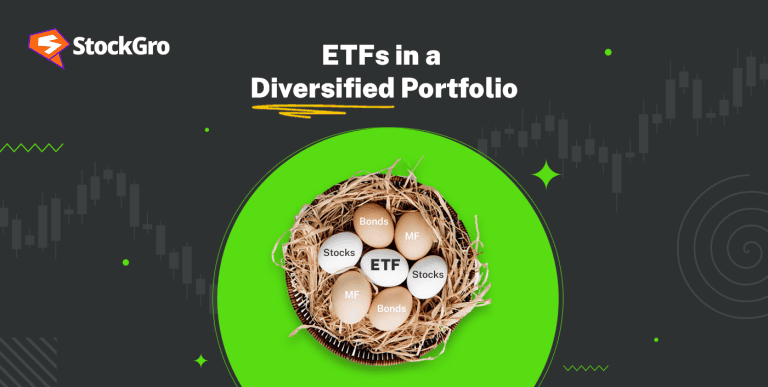
A country’s inflation rate is the annual percentage change in the purchasing power of its currency. Since money is the main medium of trade that preserves value, its buying power relies on the price levels. Money loses its worth as the prices rise. A simple definition of inflation would be the gradual increase in prices for goods and services.
Rising prices also affect the cost of living, so buying power is lowered. Likewise, this holds for the value stocks available on the stock market. Rising inflation also causes these equities’ costs to grow, lowering investors’ buying capability. Through this blog, let us explore the inflation and stock market relationship.
What is inflation and what causes it?
Inflation is the general trend of rising prices for goods and services over a period of time. For investment policies and economic planning, it is absolutely important.
India’s inflation in 2024 has displayed volatility; the Consumer Price Index (CPI) shows a rate of 6.21%, with urban areas registering 5.62% and rural areas registering 6.68%. The annual inflation rate also dropped to 5.48%, which matched market projections.
Types of inflation
Two basic forms of inflation can be generally distinguished, both of which have clearly shown themselves in India lately:
1. Cost-Push Inflation: When manufacturing costs increase, a phenomenon known as cost-push inflation results and drives up prices. Factors including rising crude oil prices, interruptions in the agriculture supply chain, and more import costs—driven by a devalued rupee—have helped to create cost-push inflation in India.
2. Demand-Pull Inflation: When there is a demand for more goods and services than there are supply, demand-pull inflation results. Demand-pull inflation in India sometimes results from strong economic growth and increasing consumer expenditure.
To know more: Different types of inflation: How does it impact your finances?
Inflation and the Indian stock markets
Numerous social, political, economic, cultural, and other factors impact the supply and demand for stocks, which in turn determines their price.
Any factor influencing the investor will influence the demand and supply of stocks; inflation is no different. The following summarizes the effects of inflation on stock market trends:
1. One’s purchasing power as an investor
Inflation, defined as a general rise in prices, is another indicator of the currency’s depreciation. So, if inflation is 5%, then ₹ 10,000 now will be worth ₹ 9,500 after a year.
Should the inflation rate rise to 10%, the same money would be worth less. Investors’ buying power thus declines as the inflation rate rises.
Since investors can buy less equities for the same money, this can directly affect the stock market.
2. Interest rates
When inflation gets too high, the Reserve Bank of India (RBI) starts charging more for loans and deposits. The concept encourages individuals to preserve money and reduce too high liquidity, lowering the inflation rate.
Since loans are more expensive as well, businesses’ capital costs rise. Consequently, the predicted cash flows are valued less, reducing equity values.
3. Effect on stocks
Rising inflation rates cause speculation on future prices of goods and services to create a somewhat erratic market. Many investors may think businesses will lose profitability when prices are rising.
Some investors may choose to sell the shares, reducing the market price. Simultaneously, buyers of these stocks by hopeful investors about the company’s future profitability could create a tumultuous atmosphere.
A change in the inflation rate has a significant influence over value equities. The market value of value stocks is typically dictated by the inflation rate. Value equities, thus, usually do better as the inflation rate increases.
Conversely, Growth stocks have very modest cash flows. Hence, they have a negative association with the inflation rate. As inflation rates climb, the market price for these equities declines.
Finally, a rising inflation rate could lower their market price if you consider dividend-paying companies. This is so because when inflation rates rise, dividends may not be able to keep ahead of them, which lessens the appeal of such companies to investors.
4. The long-term benefits to stock markets from rising inflation rates
A regulated increase in inflation rates points to a developing economy. Turning the pages of history reveals that a growing inflation rate is usually associated with increased GDP.
Keep in mind that if inflation rates are excessively high, it can trigger a dramatic decrease in purchasing power, which would be disastrous for the economy. On the other hand, overly low inflation rates can stunt the economy’s development.
Investors should evaluate if the rise is abrupt or steady by comparing inflation rates in recent years. Should inflation rates rise gradually, companies and the economy might benefit from it, as well as a suitable habitat for stocks.
You may also like: Cost inflation index – What, why and how?
How do you invest for inflation?
One thing is evident even if inflation has dropped from its multi-decade highs: businesses that can pass along price rises and manage increased costs have outpaced those unable to do so. Since the predicted rate will decrease shortly, several investments, including long-term treasury bonds and small caps, may become more appealing. Still, keeping a varied portfolio is important.
If you want to position your portfolio for growth now and in the future, consider owning some of these stocks or funds that own these firms. Companies that do well while inflation is high may continue to earn more once prices level off.
Also read: Impact of Inflation on Personal Finances
Conclusion
While a significant increase in inflation could frighten investors and cause market instability, a moderate amount of inflation is actually beneficial for economic growth. Broadly affecting stock prices and sector performance, inflation also forces investors to reconsider their asset allocation and investment approach, influencing market volatility.
The key thing to remember is to keep a diverse portfolio and consider and invest with a long-term stock market trends strategy in mind.
FAQs
1. How does inflation affect the stock market?
Higher interest rates brought on by inflation lower stock value even in cases of corporate performance. Rising rates and higher borrowing costs can reduce company expansion and profitability, lessening the appeal of stocks. Such developments often cause investors to react cautiously, generating market uncertainty. Furthermore, stock prices are influenced by inflation’s movement of money toward safer assets like bonds. Investors should review their portfolios and consider inflation-resistant investments at such times since this knock-on impact makes them vital.
2. How does US inflation affect the Indian market?
As world prices of commodities climb, US inflation affects the Indian market using more expensive imports. Higher inflation sometimes results in tighter monetary policies, including higher interest rates in advanced countries. This lowers foreign investment in India, generating market instability and currency pressure. For example, the Indian rupee loses value when the US dollar strengthens, increasing the cost of imports like crude oil. These elements influence India’s trade balance, investment environment, and general economic stability.
3. What stocks go up with inflation?
Stocks connected to commodities frequently do well as prices rise during inflation. These include metals, minerals, and energy industries that show demand despite inflation. For instance, steelmakers, gold miners, and oil companies earn more. Real estate investment trusts (REITs) can often profit as property values climb. For diverse exposure, investors can look at exchange-traded funds (ETFs) tracking businesses resistant to inflation. In inflationary times, these investments guard portfolios and may provide benefits.
4. How do inflation and interest rates affect stocks?
Usually, inflation and interest rates directly influence equities. Rising rates aimed at lower inflation make borrowing more costly for businesses, so slowing down development and lowering stock values. On the other hand, reduced rates inspire borrowing and expenditure, hence improving stock market performance. During times of monetary easing, for instance, markets often surge. Investors pay great attention to these elements since even little changes can affect stock market movements and call for portfolio changes to reduce risks.
5. Is it good to invest during inflation?
Maintaining your wealth requires wise investments made during inflation. Although inflation lowers buying ability, well-chosen assets can provide a defense. In such conditions, assets, including real estate, commodities, and inflation-linked bonds, can beat others. Keeping a portfolio growing also guarantees that your savings do not stagnate or lose value. Investing in industries that flourish during inflation helps preserve consistent returns, so it is wise to offset growing prices and guarantee long-term financial objectives.

